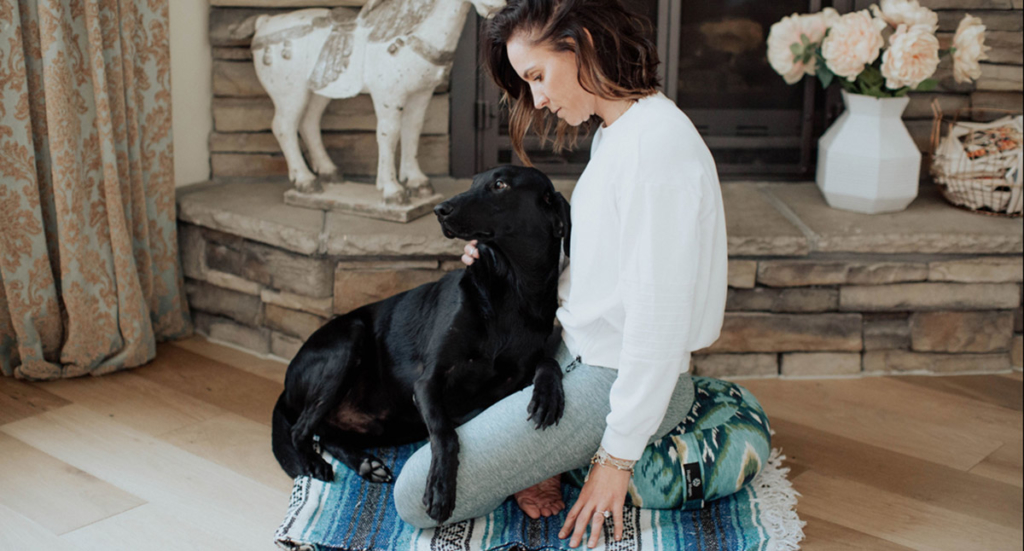
A visit from your dog can be a part of your practice.
In 1996, I attended one of a series of 30-day silent mindfulness meditation retreats. As with many retreat centers, the cabin where we practiced was designed to provide the perfect conditions—remote location, comfortable accommodations, nourishing meals, quality teachings and quiet surroundings. But this particular retreat was an anomaly.
While most of the supportive conditions were in place as usual, quiet surroundings were nowhere to be found. A cabin two lots away was under construction. From dawn until dusk we heard the constant buzz of power tools, the banging of hammers, lots of loud swearing and heavy metal music. The rarefied air at 8,700 feet is an exceptionally efficient carrier of sound. Even inside the cocoon of the retreat cabin, the sound could be piercing.
At first, my mind complained. Who were these people to intrude on my retreat? If only they’d stop what they’re doing, I could make some headway. Fortunately, it didn’t take long for me to stop taking the construction personally, which it certainly wasn’t.
By the middle of the week, my responses to the cacophony ranged from humor to barely noticing. It’s not that I didn’t hear the chaos; it simply didn’t bother me anymore. It was part of what was happening in the moment, so it became just another object of mindfulness. I was able to put it into a larger frame.
The “If Only” Trap
When we practice mindfulness, of course it’s nice to have “hothouse conditions” to help us quiet the mind. But we can’t always control our environment—outer or inner. When the conditions in our environment or in our mind aren’t what we think they should be, we can fall into the “if only” trap.
For example: If only it wasn’t so noisy, I could really meditate. If only my mind wasn’t thinking so much, I could really focus. If only my knee didn’t hurt, I could really make some progress. If only I had the right meditation cushion, I could sit without pain. Or when we’re meditating in a group: If only the person next to me wasn’t moving around so much/breathing so loudly, etc.
This can apply to yoga practice as well: If only I was stronger/more flexible/thinner/more relaxed/more energetic/in the right yoga class, I could really do yoga. Practicing yoga is not dependent on any of these things. Yoga practice is about meeting your body/mind where it is and practicing in a way that promotes balance and equanimity.
And of course, the “if only” trap can appear in our daily lives too. If only I was richer/more attractive/more driven/less driven/in a relationship/not in a relationship/had a better job/didn’t have to work, etc., my life would be so much happier.
An Endless Cycle
When we are stuck in the “if only” cycle we can never feel contented or at peace. The entire premise of “if only” is that our lives are incomplete, and only a certain condition that is currently out of our reach will make things right. Often when we get that golden thing that was supposed to lead to lasting happiness, we discover that the happiness it brings is fleeting. Soon something else appears that seems like the ticket to contentment.
Of course, it’s not wrong to wish for happiness. But so often, we look for it in things, relationships, and experiences that will never provide it. Things, relationships and experiences are always fleeting. We can enjoy them while they’re here, but expecting them to bring lasting happiness will only foster frustration.
The key to lasting contentment is not in what we have or don’t have. It is in how we respond to the ever-changing conditions of our lives. The beginning point for fostering happiness is to be present right here, right now, with our situation as it is.
Setting intentions toward more ease and happiness is a healthy endeavor. It’s expectations that trip us up. Expecting the retreat center to be a haven of silence caused disappointment and frustration. In the same way, expecting the object of our desire to satisfy us in a particular way sets us up for disappointment.
The way to peace for me on retreat 23 years ago, and the way to peace in our daily lives, is to plant a seed, water it and nourish it, and then allow it to flower in whatever way it will. Meeting the cacophony on the retreat with humor and equanimity showed me that external conditions need not determine my happiness or unhappiness. My happiness is entirely up to me.
How Mindfulness Can Help
Practicing mindfulness can help us tune into the times when we get trapped. Here are some tips for making your “if onlys” a part of your meditation practice:
- Notice when your mind is complaining about something in your experience—a physical pain, an annoying sound, an earworm, obsessive thinking. Is there aversion, frustration, a desire for it to be otherwise?
- What does this response feel like? Where does it live in your physical body? Explore the moment-to-moment experience or it.
- Then turn your awareness to the source of the annoyance, feeling the sensations of it in your body, exploring it in the same way.
- Is there a difference in the quality of your mind when you’re experiencing just the sensations of whatever is bothering you versus the sensations of your response?
What are the “if onlys” in your life? Is there a way to meet your current life with ease, even as you move toward your goals? Stay open. Guide your life in the direction you desire, and welcome how it actually unfolds.
